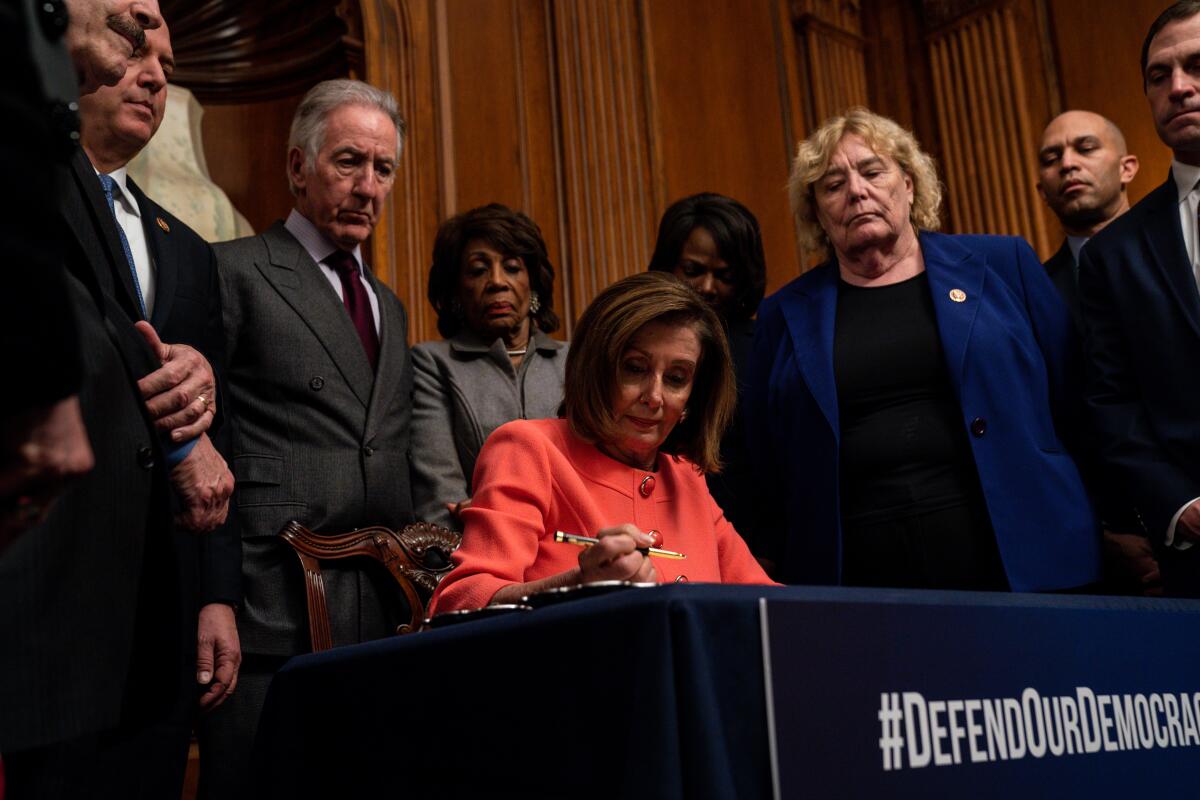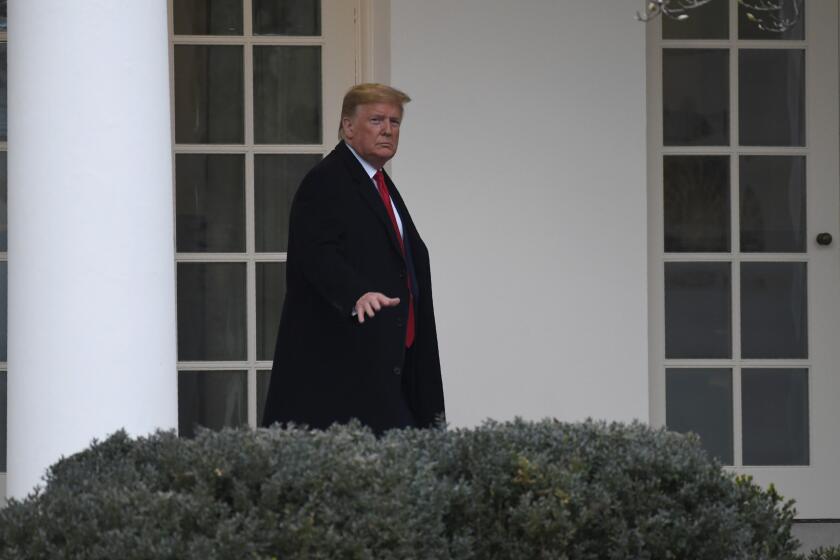Trump Senate impeachment trial: The prep, the lineup, the promises, the drama

- Share via
WASHINGTON — The impeachment of President Trump is the Senate’s challenge now.
Directed by the Constitution, House officials and prosecutors somberly carried the articles through the dimly lighted Capitol to the Senate on Wednesday evening, triggering a trial unlike any since President Bill Clinton’s in 1999. He was acquitted.
Look Thursday for a series of ceremonial matters that will set up the Senate as a court of impeachment. Oaths will be taken. An oath book will be signed. And the seven House prosecutors, called managers, appointed by Speaker Nancy Pelosi will make an appearance in the well of the Senate to present the articles.
Then the senators will be commanded to surrender their phones and pay attention and not to talk — a whole other level of challenge, especially for the four Democrats running for president ahead of the Feb. 3 Iowa caucuses.
Here’s what to watch for when the Senate opens for impeachment business:
House members in the Senate
At noon Thursday, the seven House managers will cross the Capitol and be escorted into the well of the Senate, this time to formally present the articles of impeachment. They charge Trump with abuse of power by pressuring Ukraine to help him politically and obstructing Congress’ probe into what happened.
Impeachment inquiry
What else you need to know
The prep, promises and drama of the Senate impeachment trial
The key players and terms to be familiar with
A timeline of how we got here
How impeachment works
Our full coverage of the inquiry
The prosecution team is led by House Intelligence Committee Chairman Adam B. Schiff of California and Judiciary Committee Chairman Jerrold Nadler of New York, who oversaw the impeachment investigation and hearings. The others are Reps. Zoe Lofgren of California, Hakeem Jeffries of New York, Val Demings of Florida, Jason Crow of Colorado and Sylvia Garcia of Texas.
All have a background in the law. Their challenge is to persuade four Republicans to join all Senate Democrats in demanding that the trial include new documents and witnesses that most of the GOP senators would like to avoid. Even that modest goal could prove difficult.
Watch for the managers to start dividing up topics and arguments as the team prepares to lay out its case.
With President Trump’s impeachment trial expected within days, the White House hustles to assemble his legal team and prepare his defense.
Oaths
In another extraordinary visual, Chief Justice John G. Roberts will make an appearance in the chamber. Senate Pro Tempore Chuck Grassley (R-Iowa) will administer Roberts’ oath as the court’s presiding officer. Roberts, in turn, will swear in the senators, Senate Majority Leader Mitch McConnell (R-Ky.) said.
‘Impartial justice’
The senators will swear to administer “impartial justice” on the articles, or charges. But already, the senator-jurors are questioning whether that’s possible.
McConnell has given his flat-out answer.
“I’m not an impartial juror,” he declared last month. The process is inherently political.
He also said he was coordinating tightly with the White House, a statement Democrats said was proof of McConnell’s partiality. Republicans, meanwhile, have pointed out that Democrats have widely spoken of their disdain for Trump and cast doubt on his fitness for office.
Late Wednesday, McConnell laid out how he saw the challenge for senators.
“We will pledge to rise above the petty factionalism and do justice for our institutions, for our states and for the nation,” he said.
The Senate math
100: The total number of senators.
53: The Republican majority.
51: The number of senators who must agree on almost anything to make it happen during an impeachment trial.
4: The number of Republican senators who must join Democrats to get to the magical 51.
2/3: The proportion of senators required to convict and remove a president from office. So 67 members of the Senate would have to vote to convict if every senator was voting.
The moderate gang
Watch the moderates for an emerging gang of three to four who could influence the outcome on such matters as whether to subpoena former national security adviser John Bolton. That vote won’t be taken for days, if not weeks.
Republican Sen. Susan Collins of Maine has been meeting with a small number of GOP colleagues who want to consider witness testimony and documents that aren’t part of the House impeachment investigation. Watch Republican Sens. Mitt Romney of Utah, Lamar Alexander of Tennessee and Lisa Murkowski of Alaska for signs of whether this group can stick together and force the Senate to consider additional material.
The suffering candidates
Senators love to talk. So the impeachment-trial rule against speaking or consulting phones on the Senate floor has the potential to chafe.
The ones who may suffer by that rule most, however, are the four Democratic senators forced to decamp from Iowa less than three weeks before the election’s lead-off caucuses. Look for Sens. Elizabeth Warren of Massachusetts, Bernie Sanders of Vermont, Amy Klobuchar of Minnesota and Michael Bennet of Colorado to send surrogates to Iowa or make short trips back and forth.
“I’ve told them this trial is your responsibility as senators and scheduling is not going to influence what we should do,” Senate Democratic leader Chuck Schumer told The Associated Press in an interview last month. He said none of them objected. “There are benefits of running as a senator,” Schumer added, “and there are liabilities.”
Full swing
The Senate is pausing for the Martin Luther King Jr. weekend.
Trump’s team will be led by White House counsel Pat Cippolone.
More to Read
Get the L.A. Times Politics newsletter
Deeply reported insights into legislation, politics and policy from Sacramento, Washington and beyond. In your inbox three times per week.
You may occasionally receive promotional content from the Los Angeles Times.









